

This could have been a good, although not great flick IF its producers had resisted including the mandatory "love story" component.Sinatra was a crooner, never an actor, who was able to get by and even be entertaining with a good supporting cast. He has one here with Steve McQueen as the standout.Gina Lollobrigida was never anything more than a pair of boobs with legs.These two could never have handled a GOOD script. Their personal chemistry was zero, and the painful, stilted meanderings that pass for their love scenes are downright painful to watch.Fortunately we now have the technology to spare ourselves such things. I gleefully advance through every scene with Old Blue-Eyes and Boobs Walking.Confine your viewing to Sinatra and his Kachins and you actually have a pretty good movie.
... View MoreI understand this was directed by John Sturges but it's Frank Sinatra's movie all the way. Steve McQueen, in a supporting role, was a rising star at the time and constituted competition for the Chairman of the Board. According to the Presenter on TCM, here's how Old Blue Eyes handled the potentially disturbing relationship: "Here's how it works. I show up and say my lines, and if there's any light left over, you get it." McQueen was savvy enough to keep out of Frank's way. McQueen's part was supposed to be given to Sammy Davis, Jr., but the two had had a falling out and Davis was temporarily in the dog house.That's all okay. Sinatra was never noted for his reticence or his modesty. The problem is that he seemed at times to believe that his movie career could be carried along by the momentum provided simply by his presence. This is one of his lazier performances. (His better ones include "The Manchurian Candidate" and "From Here to Eternity.") The story has to do with Sinatra and his crew training Kachin tribesmen of the Burma highlands to wage war against the Japanese occupiers in World War II. The Kachin, for what it's worth, are well-known in anthropological circles. But this narrative, as simple as it seems, remains unfocused. There aren't any scenes of Sinatra's crew training the Kachin. You can't tell who is a Kachin and who is an ordinary Burmese.We can be sure that Gina Lollobrigida is not a Burmese. She's a glamorously made-up Hollywood star who is the mistress of Paul Henreid. After a brief period of emotional turbulence, she decides to run off with Sinatra. She doesn't sweat. The climate is that of a tropical rainforest and she doesn't sweat. Nobody sweats. Everyone's uniforms are clean and dry. Sinatra is outfitted in a faux military corduroy uniform and one of those AnZac hats with the brim curled up on the side. The shoulders are extraordinarily broad and the rest of the uniform loose and baggy. Watching him walk is a painful experience.There are some scenes of combat that are pedestrian but exciting anyway, even if they're just taken as a relief from the dreary love story between Sinatra and Lollobrigida.Nice photography by William Daniels. The score by Hugo Friedhofer is lush and romantic and eminently forgettable. You want a good war movie about battle in the China-Burma-India theater? Watch "The Bridge on the River Kwai."
... View MoreIn and of itself, the idea of 97 lb. weakling Frank Sinatra playing an action hero is preposterous. I'm sorry but Mr. Sinatra might have struck a certain manly chord in a six hundred dollar suit, holding a highball glass and a smoldering Chesterfield but with his Hepburn neck and delicate shoulders he's miscast here. The plot, apparently based on some real life derry-do, is nonetheless implausible with Sinatra's ratpack jocularity trumping rank structure and cultural norms, as though he's holding forth at an after-hours Vegas smoker. The film further labors under sundry staging goofs and the otherworldly appearance of GinafrickingLollobrigida in a little black cocktail dress and stilettos. In the Burmese Theater of operations?? Oi! Suspiciously convenient for the Chairman of the Board, I must say. When Sinatra walks through a doorway and finds Gina in soft focus, heaving a throaty sigh and prancing around in those patent-leather pumps, I'm reminded of Billy Pilgrim rooting around on a chaise with Valerie Perrine in outer space. In one action shot, two trucks are running next to each other and the men in one truck are machine-gunning enemy troops by firing directly 'through' the other truck! No, I'm sorry Frank Sinatra is a little thin in the hips to be an action hero. Peter Lawford always looks like he's trying to keep up with Frank and Frank is delivering lines which would never fly except that he's Frank Sinatra. Basically a cartoon. What the heck were Steve McQueen and Charles Bronson doing in this movie?
... View MorePlenty of spoilers so be warned. The main point is, Steve McQueen stole every scene he was in.It's more hokey and not nearly enough camp. I reckon in this, The Age of Internet, every Tom, Dick, and Harry off-the-street can recognize sloppy casting (hey, all Asians look alike!) and bad sets (Burma jungles look just like California forest).I was watching Sinatra, with a beatnik beard, an Aussie hat, and his pet monkey, hang out with his best pal, an English Gentleman officer. A best pal always gets it, especially when they're a Fine English Gentleman with a Monocle (tm).Frankie kicks his beautiful red-headed girl to the curb for Gina Lollobrigida, and punishes Gina with his acting. I thought he was great in "The Man with a Golden Arm" but he's no Elvis in this one. Take the Elvis comment however you want to.Speaking of back monkeys, Frankie has a monkey on his back in this movie. Not the same kind of monkey as "Golden Arm", but this time he gets the monkey off his back. Well, the Japanese (fighting with American rifles and machine guns and driving American jeeps), kill the monkey. As Black Flag nearly said, "I've got a monkey on my back and it's not my imagination".The director, John Sturges best known for "The Great Escape", did us a favor and Peter Lawford wasn't Frankies best pal -- no hokey English accent. Oh, and word is, Sammy Davis, Jr was set to be in the movie. He had the gall to say he was a better singer than Sinatra. Sinatra kicked him to the curb, too.Dean Jones, the Shaggy DA, fights Charles Bronson -- who's playing a Navajo. I ask, "How come George Takei isn't playing a Burmese soldier? Oh, maybe this was made when Star Trek was on the air".Then Takei makes his appearance! This movie came out in 1959. Totally my mistake because Sinatra looked a little haggard.Whenever any of the Japanese, Italian, Chinese actors playing the Kachin natives of Burma were shot, they'd apologize to Sinatra for dying in their "me so horny, me love you long time" dialect.Eventually Frankie sneaks across the Burmese border, over to China. There were renegade Chinese soldiers, who slaughtered 34 American soldiers in Burma. This made Frankie mad. Very mad. So he takes the passed-out-drunk Chinese platoon hostage without firing a shot.The only shots fired are Frankie killing officers. He realizes he's in trouble for doing this, plus crossing a border, so he sends Steve McQueen out to slaughter the still drunk unarmed prisoners. Steve's glad to do it. It's no Mai Lai Massacre but it still brings in a "tsk tsk" from American GI Management and Frankie and Gina run off to be married, or as he puts it, "keep you pregnant, barefoot and in the kitchen". Really.
... View More